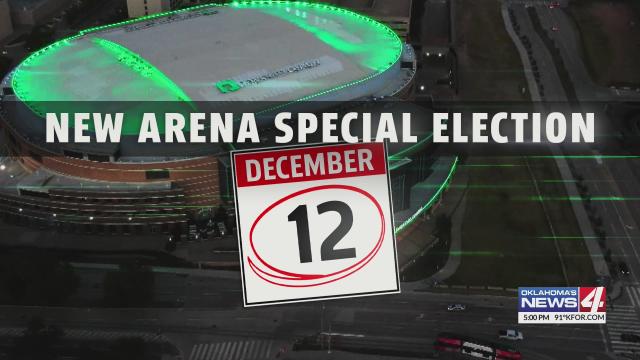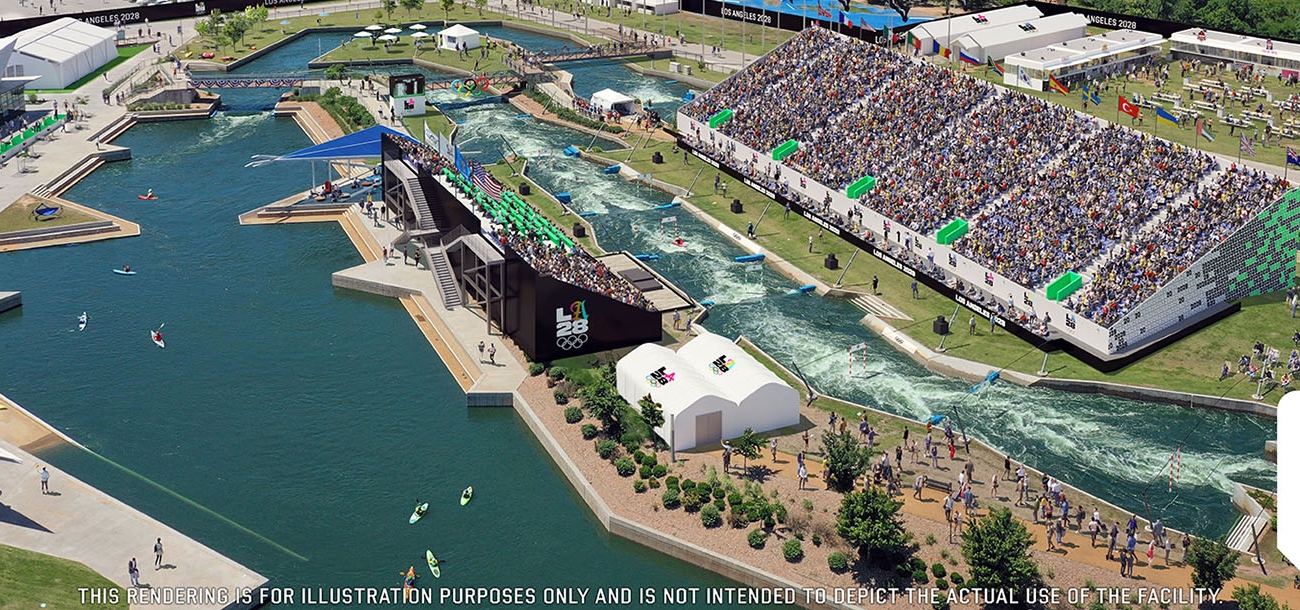OKC kicks off campaign for NBA arena
Voters will decide on proposal December 12th
City leaders officially kicked off their campaign Thursday to convince voters to approve a $900 million arena for the
Oklahoma City Thunder NBA team that would be largely paid for through a one cent sales tax.
The launch event, which drew about 300 people to the Thunder Community Court at Scissortail Park in downtown
Oklahoma City, was the start of what is expected to be a two-month-plus publicity blitz before the Dec. 12 vote under
the banner: “Keep OKC Big League 2023.”
It came just two days after an Oklahoma City Council majority approved the new arena proposal and sent it to the ballot.
Supporters say the new arena is critical to keeping the team in the city. Oklahoma City Mayor David Holt, who has publicly
called for a new arena since July 2022, spoke at the event, urging supporters to spread the word ahead of the special election.
His address reiterated comments he often has made since last summer, connecting the growth of the city to the Thunder’s arrival
in 2008 and casting approval of the new arena as maintaining the city’s momentum.
“This is the greatest gift we could give the next generation: an assurance that we will be a big league city beyond 2050,”
Holt told the audience. “And that comes with all of the things that being a big league city has meant to us. You want to
help people in our city? We have to have the economic strength to do that. We have to be ‘big league.’ ” Sean Trauschke,
both the CEO of Oklahoma General Electric Company and the chairman of the Greater Oklahoma City Chamber of Commerce,
also spoke at the event. He echoed Holt’s call for voters to support the new arena.
“The impact of this arena goes so much beyond the jobs and the economic impact,” Trauschke told The Oklahoman. “The idea
that you’re investing today for tomorrow, I think it’s huge, and I don’t think this is as much about us today as it is more about
the kids. The next generation is the one that we’re doing this for, and I think that’s what we ought to be focused on.”
City’s ‘big league’ status at stake after Thunder negotiations
Opponents of the arena campaign argue that the penny sales tax meant to finance the arena could be better spent on other city
projects, such as solutions for homelessness, mental health services, and infrastructure.
They’ve also criticized the Thunder’s ownership for contributing $50 million toward arena construction, about 5.5% of the minimum
cost. Other NBA teams elsewhere in the United States have donated significantly higher percentages toward their arenas.
“Our arena is going to be 95% on the back of taxpayers,” Nick Singer, spokesman for Oklahoma Progress Now, said Tuesday.
“We’re in a city that has a tremendous amount of needs. We are often asked to delay things, to delay services that we desperately
need, and we just feel that that’s an unfair bargain.”
Holt acknowledged these criticisms Thursday but told The Oklahoman that his role as a leader was one of “cold realism” and that the
city’s growing international recognition was at stake if the Thunder were to leave.
“My role, and it can be a thankless one at times, is to tell you the truth and to tell you the reality of this situation,” Holt said.
“I can’t tell you fantasies. I can’t tell you that you can have it all just the way you want it. This is a hyper-competitive business.
I’ve been saying that for over a year now, and I said that for a reason. We are the 42nd-largest market in the United States in a
league with 30 teams. We’re going to have to do a lot to keep this team.”
“The only people who lose, if we don’t keep the team, are the people of Oklahoma City, our economy, our ability to help people,
our brand and our long-term economic growth,” the mayor added.
Thunder ownership, led by Chairman Clay Bennett, signed a three-year extension this year to continue playing in OKC while
negotiations with city management were underway. If voters pass the proposal in December, the Thunder have agreed to play
at Paycom Center, the city’s current NBA arena, until the new one is built, and then play at the new arena for 25 years.
Civic leaders begin showing support for the arena
Dozens of businesspeople and civic leaders were among Thursday’s crowd, including Kari Watkins, who is deeply familiar with what
the city was like before the current arena was built and the Thunder arrived. Watkins is the executive director of Oklahoma City
National Memorial & Museum, dedicated to the 1995 bombing of the Alfred P. Murrah Federal Building that resulted in the deaths
of 168 people.''
“In 1995, we saw our city come together in the worst of times, and we’ve proven that when we come together, we’re better and
stronger together,” Watkins told The Oklahoman. “We’re the city on the hill, and we’ve got a responsibility to keep the momentum going.”
Chris Semrau, general manager for Paycom Center, said Thursday’s kick-off event was “a historic step” toward investing in the city’s
quality of life. He also told The Oklahoman that future plans for the current arena were still yet to be determined.
“The focus has been on getting the vote passed, keeping the Thunder in the city and then looking at what all those opportunities create
for the Thunder and the community,” Semrau said.
Semrau said it takes more than 1,000 workers in the Paycom Center to help successfully host events at the current arena, excluding any
effect on surrounding businesses during a game day or a concert.
“Hopefully, when we’re successful here, some of the folks who may not support today will see the benefits that creates down the road,”
Semrau said.
Campaign costs to be determined, financers to be announced soon
Tyler Moore, manager of Keep OKC Big League 2023, said the Greater Oklahoma City Chamber of Commerce is running the campaign,
but that various contractors are occupying different roles. The Chamber has been promoting different initiatives on behalf of the city
since 1910, when it coordinated an effort that saw voters make Oklahoma City the state’s capital.
“We were just extremely pleased with the turnout, and just the broad support we’re receiving,” Moore told The Oklahoman.
“We’re excited to continue this conversation with groups all around the city and the state.”
Cynthia Reid, senior vice president of marketing and communications for the Chamber, said the arena campaign will be funded
through the chamber’s membership and private funds of various partners.
“We don’t have a final budget,” Reid told The Oklahoman.
“I think that’s always dependent on the opposition and counter-balance and what we need to do. We’ll make that decision as we go.
I can’t really give you a number at this point.
“Less is always better, but we’ll spend what we need to in order to make this happen.”
A list of different businesses and organizations officially endorsing the arena proposal is expected to be released in the coming weeks,
Reid said.












